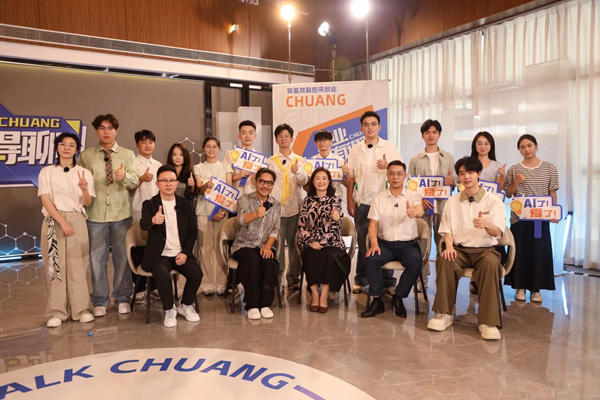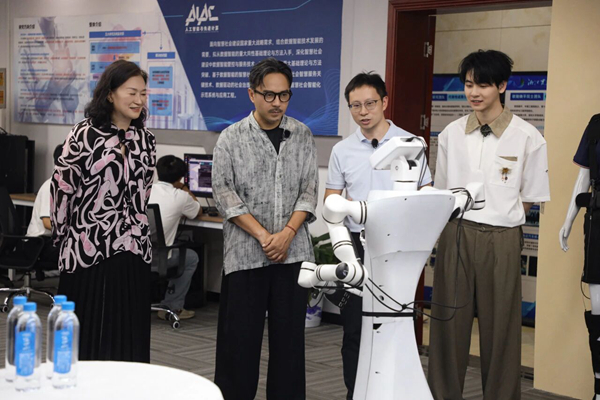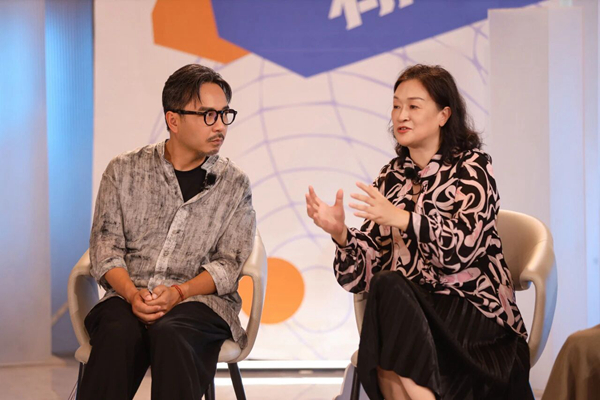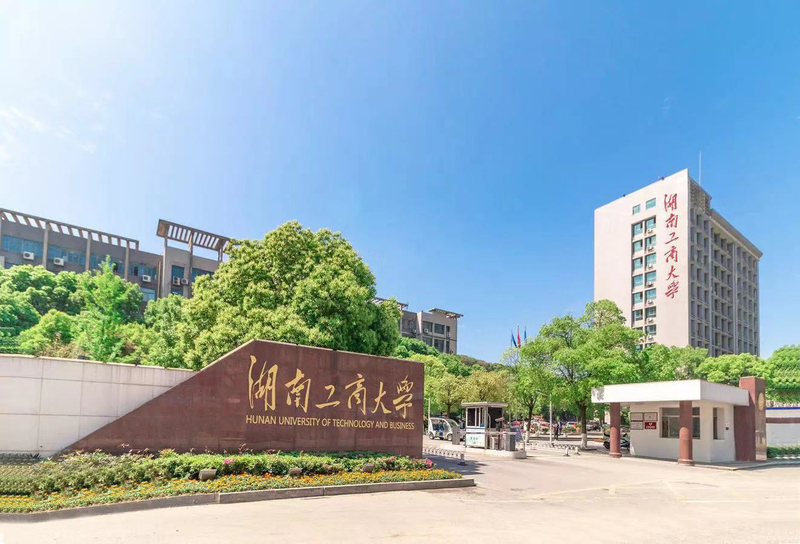Academician Chen Xiaohong Visits Hunan TV's "TALK CHUANG" to Discuss AI Entrepreneurship
2025-09-02
On the evening of August 31, Academician Chen Xiaohong, Secretary of the CPC HUTB Committee, Entrepreneurship Strategy Tutor for Hunan Province, and Director of Xiangjiang Laboratory, was a guest on Hunan TV's program “TALK CHUANG”. She provided insights and answered questions regarding entrepreneurship in the field of Artificial Intelligence.
She states that artificial intelligence is deeply integrating into production and daily life, becoming a "second intelligence" driving social progress. China has entered the global first tier in key AI technology areas such as voice recognition, computer vision, and large language models. The country possesses significant advantages in market scale, data resources, and industrial application scenarios. As a key platform for artificial intelligence innovation in Hunan, Xiangjiang Laboratory promotes technology implementation and industrial empowerment with its integrated "Four-Computing-in-One" framework. Academician Chen Xiaohong encourages young people to build a solid foundation in AI technologies, focus on genuine pain points, and engage in AI entrepreneurship with a problem-solving oriented approach. "Fill your mind before you fill your pockets," she says, advising continuous learning and value creation in this long-term endeavor.

Episode 20 of Hunan TV's “TALK CHUANG” (Online Link)
Wang Han:
Hello, Academician Chen. I consider myself a novice in AI. Although we've known each other for so long, I've never asked you this question: how exactly should we understand the relationship between AI and our daily lives?
Academician Chen Xiaohong:
Simply put, AI is a system capable of mimicking certain intelligent human behaviors. Just like us humans, who can see, hear, speak, think, learn, and make decisions, the goal of AI is to endow machines with some of these capabilities, or even perform better than humans in certain aspects. Its purpose is not to replace humans, but to serve as a second intelligence, an additional brain that helps people achieve the functions mentioned above.
Zhuang Yuguang:
I feel that current AI is somewhat similar to “electricity” in the past.
Academician Chen Xiaohong:
Electricity was used to power machines, taking over many tasks previously done by people, right? So, the convenience and transformation that electricity brought us, artificial intelligence can similarly bring us in the future. So, the AI we have today is still at an entry level. In the future, we can expect advancements in cognitive and decision-making intelligence, further integrating into all aspects of production and daily life, as just discussed.

Zhuang Yuguang:
I've heard that our Xiangjiang Laboratory is a key project supported by the Hunan Provincial Committee of the Communist Party of China and the People's Government of Hunan Province, known as “Hunan's Super Brain”. So, we'd like to see what specific AI application scenarios are being implemented here?
Academician Chen Xiaohong:
We have proposed what is called the “Four-Computing-in-One” framework, which encompasses computable data, algorithms, computing power, and computing networks. Through this integrated approach, we advance AI from theoretical research to practical application, enabling implementation and driving industrial innovation and development.
Wang Han:
The academician is a native of Changsha, Hunan, and has a remarkable background, having been admitted to Central South University at the age of 16.
Academician Chen Xiaohong:
It was called Central-South Institute of Mining and Metallurgy at that time.
Wang Han:
You were among the first generation to study computer science. But later, you branched out into interdisciplinary fields, moving into—
Academician Chen Xiaohong:
Management Science and Engineering.
Wang Han:
Thus, you became a pioneer in the intelligent management and decision-making for China's resources and energy, promoting smart mine management, enterprise digitalization and informatization, and contributing to national policies like the construction of a “Resource-Conserving and Environment-Friendly Society”.
Wang Han:
Actually, many people are curious to know, what position does China's AI technology currently hold in the world? China and the West are now competing in the AI race. So, where do our current advantages roughly lie?

Academician Chen Xiaohong:
That is indeed an excellent question. I believe we are now in the world's first tier, especially in AI application fields where we are on par with the United States—such as in voice recognition, computer vision, and large model training. We possess very strong R&D capabilities and practical application abilities. China also has a massive market, abundant data resources, and a vast array of application scenarios. This is because our manufacturing and industrialization sectors are among the world's most advanced. This provides us with a multitude of such scenarios. So I believe this is one of our significant advantages. Furthermore, we have teams that are exceptionally capable of tackling tough challenges. Look at these young people, they are full of passion. Therefore, I believe AI is a global relay race. China is not merely a follower, but one of the front-runners. We must have full confidence, and we have the conditions to achieve breakthroughs in more key areas in the future.
Wang Han:
Wondershare's entrepreneurial practice shares some similarities with the concept at HUTB.
Academician Chen Xiaohong:
Therefore, we are also providing a platform to learn about AI and to start businesses based on it. Including a few years ago, we achieved full AI coverage—AI general education courses are taken by students across all majors, alongside courses on large AI models and AI+ industry-specific curricula. The name “Engineering and Business” reflects our aim to cultivate interdisciplinary talent through a combination of “new engineering courses” and “new business courses”.
Zhuang Yuguang:
I'd like to ask both of you, would you recommend that university students enter the AI field? Or rather, what should we do to prepare for entering this field?
Academician Chen Xiaohong:
This is also a realistic and challenging topic. AI is indeed a hotspot, but it's also a long-term race. Therefore, entrepreneurship is not about making PPTs, but about solving problems. If university students can settle down, build a solid technical foundation—"fill their minds before their spockets"—and pay more attention to real-world difficulties, pain points, and blockages, they are fully capable of going further in this AI marathon.
At the event, four university student entrepreneurs conduct product demonstrations and project presentations. Academician Chen Xiaohong provides insightful comments. Zhou Bin, Deputy Director of the Department of Science and Technology of Hunan Province, introduces relevant policies supporting university student entrepreneurs in Hunan. Two student entrepreneurs raise questions regarding challenges encountered in their practical entrepreneurial experiences. Academician Chen Xiaohong offers interpretations and responses based on real-world contexts, providing valuable suggestions for the startup teams. All participants find the session highly beneficial.
(Compiled by Wang Xujun and Mao Zihan)









